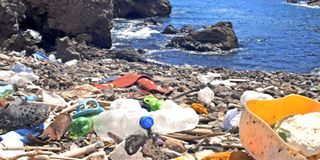Call for ban on plastic bottles as oceans choke on pollution

Plastic can take decades to thousands of years to degrade.
What you need to know:
- Plastics can carry micro-organisms that can cause diseases among the aquatic animals.
- Two years ago, Kenya introduced the ban on manufacture and importation of plastics bags to protect the environment.
- Several other African countries have outlawed plastic carrier bags, including Rwanda, Mauritania and Eritrea.
Ban plastic bottles to save people and aquatic life , researchers have told the government.
The researchers warned that as plastic pollution increases in the country, Kenyans will suffer from health complications related to pollution.
Kenya Marine and Fisheries Research Institute CEO James Njiru said by 2050 there will be more plastics than fish in the oceans and lakes. "The plastics will be about 50 million metric tonnes more than the fish in the oceans," said Prof Njiru.
Some of the plastic waste is generated by water vessels, abandoned fish gears and other deposited by rivers. Plastic can take decades to thousands of years to degrade.
Often fish and birds mistake the small plastic particles for food. "Unfortunately, the fish feed on micro plastics which end up on our dinner tables. Plastics are known to affect human health," he said.
Similarly, the plastics are known to cause injuries and some entangle the fish and mammals in the oceans and lakes. "Plastics not only suffocate the fish but also bloat their digestive system," said the CEO.
Outlawed bags
In addition, the plastics can carry micro-organisms that can cause diseases among the aquatic animals. "We have been asking the government and the relevant stakeholders to pass plastic reduction policies and the industries to minimise plastic packaging," said Prof Njiru.
Two years ago, Kenya introduced the ban on plastic of manufacture and importation of plastics bags to protect the environment.
Several other African countries have outlawed plastic carrier bags, including Rwanda, Mauritania and Eritrea.
National Environment Management Authority (Nema) Kisumu County Director Tom Togo said they have implemented the law, with many offenders arrested. "The plastic bottles end up blocking the flow of water at river mouths. We have tried our best. It is up to the consumers to change their plastic disposal habits before it damages the oceans and lakes," said Togo.
“Plastic bags and bottles have blocked the mouth of River Kisat, for instance. The move to ban the use of disposable water plastic bottles will also enhance clean environments in the parks and forests,” said the Nema official.



